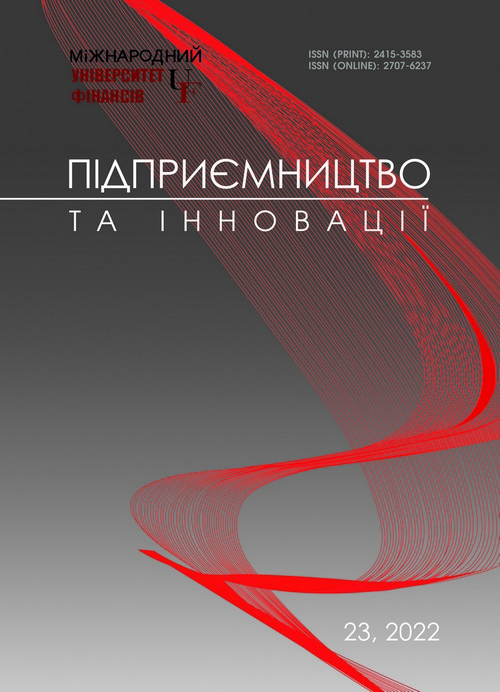ECONOMIC GROWTH AND MARKET EQUILIBRIUM
Abstract
The article is devoted to the characterization and generalization of the main views of economists on the nature of market equilibrium as a prerequisite for economic growth. The following research methods are used in the article: analysis and synthesis, systematization and generalization, historical-genetic and monographic methods. Based on the analysis of the works of the main representatives of various currents of economic theory, it is found that economic growth is accompanied by market imbalances caused by imbalances in social production and consumption, mismatch of flows of goods and incomes in the macroeconomic cycle. Based on the research of approaches of different currents of economic thought on the issue of economic growth and maintaining market equilibrium, it was found that each theory of economic growth tries to explain the optimal conditions of macroeconomic proportionality, defining the following: market competition; stimulating aggregate demand through consumption, savings and investment, government regulation; availability of resources and their most rational combination for production purposes; foreign markets; development of institutions and state industrial policy. It is established that the actual achievement of market balance conditions in economic growth is quite difficult, as it requires not only a single action of these factors, but the impact of their whole complex, because in countries where insufficient production resources, inefficient public policy and underdeveloped inclusive institutions, even unprecedentedly high rates of accumulation and innovation will not be able to ensure stable economic growth of the country. In the article it is proposed to solve this problem to use a comprehensive action of these factors in order to stimulate the reproduction of capital in its various forms. The results of the conducted study can be used by public authorities in the formulation of the country’s economic growth strategy. It should be carried out taking into account the theoretical and practical developments of economic theory, which have been tested by time, history and experience of different countries.
References
Видобора В.В. Інвестиційні ресурси економічного зростання в умовах макроекономічного розбалансування економіки України. Науковий вісник Херсонського державного університету. Серія: Економічні науки. 2018. Вип. 30. Ч 1. С. 7–10.
Кенэ Ф. Избранные экономические произведения. Москва : Государственное социально-экономическое издательство, 1960. 551 с.
Смит А. Исследование о природе и причинах богатсва народов. Москва, 1962. 684 с.
Сисмонди С.Ж. Новые начала политической экономики, или О богатстве в его отношении к народонаселению. Москва, 1936. Том 1. С. 138.
Маркс К., Енгельс Ф. Сочинения. 2-е издание. Москва : Политиздат, Т. 24. 1961. 649 с.
Люксембург Р. Накопление капитала. М.-Л. : Гос. соц.-экон. издательство, 1931. 472 с.
Шикіна Н.А. Класики економічної теорії щодо проблеми економічної рівноваги. Вісник соціально-економічних досліджень. 2002. Вип. 11. С. 49–53.
Кейнс Д. Общая теория занятости, процента и денег / Антология экономической классики: в 2 т. Москва : «Эконов», 1992. Том 2. С. 135–432.
Swan T.W. (1956). Economic growth and capital accumulation. Economic Record. Vol. 32, no. 63, pp. 334–361.
Acemoglu D. (2012). Introduction to economic growth. Journal of Economic Theory. Vol. 147, no. 2, pp. 545–550.
Райнерт Э.С. Как богатые страны стали богатыми, и почему бедные страны остаются бедными / пер. с англ. Н. Автономовой; под ред. В. Автономова. Москва : Изд. дом гос. ун-та Высшей школы экономики, 2011. 384 с.
Жданова Л.Л. Нагромадження капіталу та економічне зростання у відкритій економіці. Економічний форум. 2019. № 4. С. 4–10.
Аджемоглу Д., Робинсон Дж. А. Почему одни страны богатые, а другие бедные. Происхождение власти, процветания и нищеты. Москва : АСТ, 2015. 1083 с.
Vydobora V.V. (2018) Investytsiini resursy ekonomichnoho zrostannia v umovakh makroekonomichnoho rozbalansuvannia ekonomiky Ukrainy [Investment resources of economic growth in the conditions of macroeconomic imbalance of the economy of Ukraine]. Naukovyi visnyk Khersonskoho derzhavnoho universytetu. Seriia: Ekonomichni nauky. Vol. 30. Ch. 1, pp. 7–10.
Kene F. (1960) Izbrannyye ekonomicheskiye proizvedeniya [Selected economic works]. Moskva: Gosudarstvennoye sotsial’no-ekonomicheskoye izdatel’stvo. (in Russian)
Smit A. (1962) Issledovaniye o prirode i prichinakh bogatsva narodov [Research on the nature and causes of the wealth of peoples]. Moskva. (in Russian)
Sismondi S.ZH. (1936) Novyye nachala politicheskoy ekonomiki, ili O bogatstve v yego otnoshenii k narodonaseleniyu [New beginnings of political economy, or On wealth in relation to population]. Is. 1. Moskva. (in Russian)
Marks K., Yengel’s F. (1961) Sochineniya [Works]. 2nd edition. Vol. 24. Moskva: Politizdat. (in Russian)
Lyuksemburg R. (1931) Nakopleniye kapitala [Accumulation of capital]. Moskva: Gos. sots.-ekon. Izdatel’stvo. (in Russian)
Shykina N.A. (2002) Klasyky ekonomichnoi teorii shchodo problemy ekonomichnoi rivnovahy [Classics of economic theory on the problem of economic equilibrium]. Visnyk sotsialno-ekonomichnykh doslidzhen. Vol. 11, pp. 49–53.
Keyns Dzh.M. (1992) Obshchaya teoriya zanyatosti, protsenta i deneg [General theory of employment, interest and money]. Antologiya ekonomicheskoy klassiki: v 2 t. Tom 2. Moskva: «Ekonov». (in Russian)
Swan T.W. (1956) Economic growth and capital accumulation. Economic Record. Vol. 32, no. 63, pp. 334–361.
Acemoglu D. (2012) Introduction to economic growth. Journal of Economic Theory. Vol. 147, no. 2, pp. 545–550.
Raynert E.S. (2011) Kak bogatyye strany stali bogatymi, i pochemu bednyye strany ostayutsya bednymi [How rich countries got rich and why poor countries stay poor] (eds. Avtonomova V.) Moskva: Izd. dom gos. un-ta Vysshey shkoly ekonomiki. (in Russian)
Zhdanova L.L. (2019) Nahromadzhennia kapitalu ta ekonomichne zrostannia u vidkrytii ekonomitsi [Capital accumulation and economic growth in an open economy]. Ekonomichnyi forum, no. 4, pp. 4–10.
Adzhemoglu D., Robinson Dzh.A. (2015). Pochemu odni strany bogatyye, a drugiye bednyye. Proiskhozhdeniye vlasti, protsvetaniya i nishchety [Why some countries are rich and others are poor. The origin of power, prosperity and poverty]. Moskva: AST. (in Russian)



